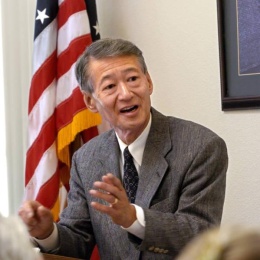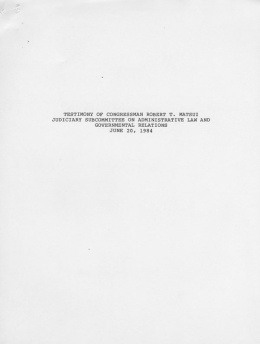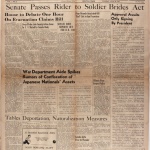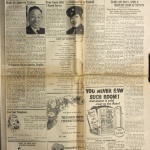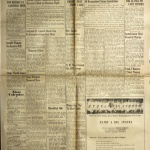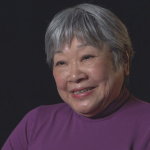Robert Matsui
| Name | Robert Matsui |
|---|---|
| Born | September 17 1941 |
| Died | 2005 |
| Birth Location | Sacramento, CA |
| Generational Identifier |
Robert Matsui (1941–2005) was a pioneering Japanese American Congressman from Sacramento who served thirteen terms in the U.S. House of Representatives. A popular and influential legislator, he was known for his support of children's issues and free trade. Incarcerated as a young child in American concentration camps due to his Japanese ancestry, he became a strong proponent of redress and reparations legislation while in Congress.
Early Life and Entry into Politics
Robert Takeo Matsui was born on September 17, 1941, in Sacramento, California, to Yasuji and Alice Matsui. He was just six months old when his family was removed from their home and incarcerated first at the Pinedale Assembly Center , then at Tule Lake . The family resettled initially in Caldwell, Idaho, before returning to Sacramento in 1945 when the West Coast was reopened to Japanese Americans. (See Return to West Coast .) He graduated from Sacramento's C. K. McClatchy High School in 1959. He attended the University of California at Berkeley, graduating with a degree in political science and continuing on to law school at Hastings College of Law, graduating in 1966. While in law school, he met Doris Okada. The couple married in 1966 and moved to Sacramento, where Matsui opened his own law practice.
He first ran for political office in 1971, when reapportionment of Sacramento City Council seats created an opportunity. Running a true grassroots campaign—on a paltry $8,600 budget—he managed to win election in District 8. He was elected to a second term and was elected vice-mayor in 1977. In 1978, longtime Democratic U.S. Congressman John E. Moss announced his retirement and encouraged Matsui to run for his seat. When he won a close race over four other Democrats, he became just the second Japanese American from the continental U.S. to be elected to Congress (the first was Norman Mineta of San José, California) and the first Sansei. He would go on to serve thirteen consecutive terms in Congress.
Role in Redress Movement
In the 1970s, momentum within the Japanese American community for monetary reparations for their World War II exclusion and confinement began to build. As a congressional freshman from a largely white district, Matsui was not a strong supporter of the Redress Movement early on. [1] During his first term, Senator Daniel Inouye came up with the idea to seek legislation for a study commission rather than for direct reparations. Matsui and all of his Japanese American congressional colleagues supported this legislation that created the Commission on Wartime Relocation and Internment of Civilians (CWRIC). He did not appear before the CWRIC and also did not support reparations bills introduced by Mervyn Dymally in 1982, prior to the release of the CWRIC report.
For various reasons—the CWRIC's recommendation of monetary reparations, the growing consensus within the Japanese American community, and his own greater security and seniority as a Congressman—Matsui evolved into a strong proponent of redress legislation in the 1980s. As an increasingly popular member of the House (by 1987, he was assistant majority whip at large), he lobbied his colleagues to support redress legislation, relating his own personal story. Just prior to the vote on H.R. 442 on September 17, 1987, he delivered a stirring speech before the full house:
How could I as a 6-month-old child born in this country be declared by my own Government to be an enemy alien? How can my mother and father who were born in this country also be declared a potential enemy alien to their country? That is the underlying issue here. They did not go before a court of law, they did not know what charges were filed against them. They were just told "You have 3 days to pack and be incarcerated," That is the fundamental issue here. [2]
In a historic vote, the House passed H.R. 442, which was eventually signed by President Ronald Reagan on August 10, 1988, as the Civil Liberties Act of 1988 .
As Congressman and Passing
As a congressman, Matsui was perhaps best known for his advocacy of free trade issues. He was a key figure in rallying Democratic support for the controversial North American Free Trade Agreement (NAFTA) in 1993 and for permanent trade relations with China in 2000. He also became known for his support of children's issues and was one of the authors of what became the State Children's Health Insurance Program (SCHIP) in 1997. Matsui became a member of the powerful House Ways and Means Committee, eventually becoming the third ranking member of the committee. He also chaired the Democratic Congressional Campaign Committee.
He died on January 1, 2005, due to complications of Myelodysplastic Syndrome, a rare blood disease. In a special election on March 8, 2005, his wife Doris Matsui was elected to fill his seat and has been reelected to the present.
For More Information
California State University, Sacramento. "The Honorable Robert T. Matsui Legacy Project: Road to Redress and Reparations." http://digital.lib.csus.edu/mats/index.php .
Hatamiya, Leslie T. Righting a Wrong: Japanese Americans and the Passage of the Civil Liberties Act of 1988 . Stanford: Stanford University Press, 1993.
Maki, Mitchell T., Harry H.L. Kitano, and S. Megan Berthold. Achieving the Impossible Dream: How Japanese Americans Obtained Redress . Forewords by Robert T. Matsui and Roger Daniels. Urbana: University of Illinois Press, 1999.
Murray, Alice Yang. Historical Memories of the Japanese American Internment and the Struggle for Redress . Stanford: Stanford University Press, 2008.
Nakanishi, Don T., and Ellen D. Wu. "Robert Matsui." In Distinguished Asian American Political and Governmental Leaders . Westport, Conn.: Greenwood Press, 2002: 117–19.
Footnotes
- ↑ Leslie T. Hatamiya, Righting a Wrong: Japanese Americans and the Passage of the Civil Liberties Act of 1988 (Stanford: Stanford University Press, 1993), 114, 117.
- ↑ Civil Liberties Act of 1987 House floor debate, Sept. 17, 1987, Congressional Record, p. 24304, http://digital.lib.csus.edu/cgi-bin/showfile.exe?CISOROOT=/mats&CISOPTR=189&filename=151.pdf ; see also http://digital.lib.csus.edu/cdm4/item_viewer.php?CISOROOT=/mats&CISOPTR=212&CISOBOX=1&REC=13 for video of Matsui delivering these remarks.
Last updated May 7, 2013, 7:04 p.m..

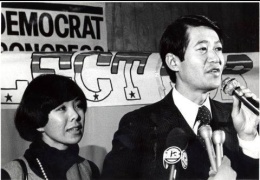 Media
Media
